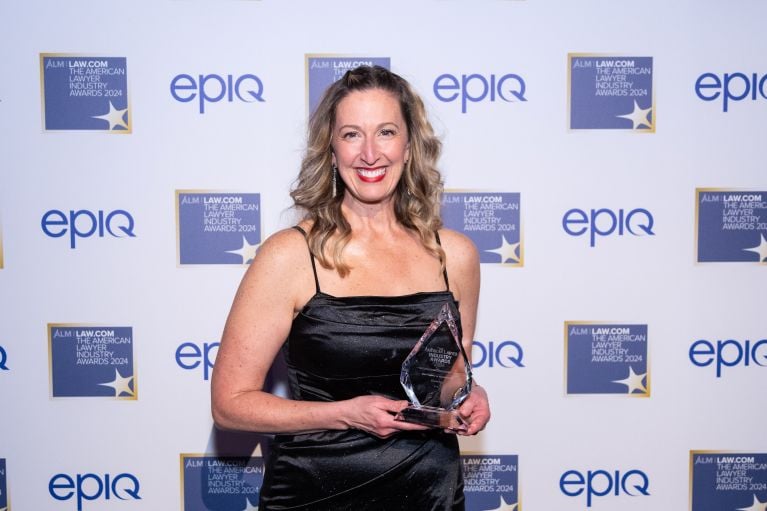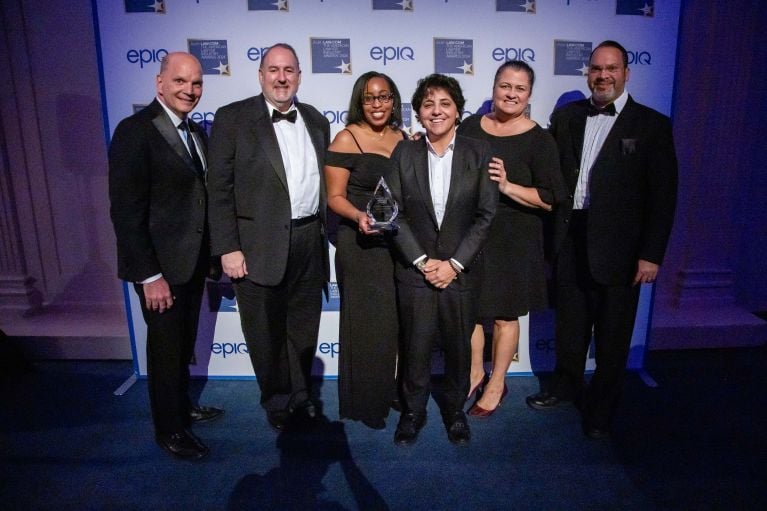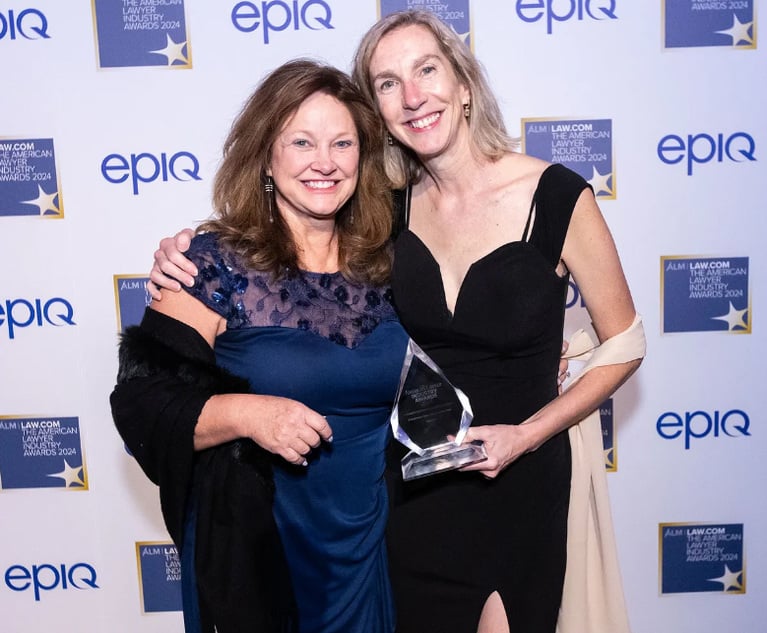 Allen Lo, vice president and deputy general counsel, head of intellectual property, Facebook. (Photo: John Disney/ALM)
Allen Lo, vice president and deputy general counsel, head of intellectual property, Facebook. (Photo: John Disney/ALM)In-House Counsel Role Evolves With Increased Importance of IP
Now that intellectual property issues have entered the mainstream, the role of companies' IP counsel has becoming increasingly strategic, high-ranking in-house IP lawyers said during a panel discussion at the Minority In-House Counsel Association's annual conference in Atlanta.
November 02, 2018 at 08:16 PM
4 minute read
When longtime patent lawyer Allen Lo started out in the business nearly 30 years ago, his work wasn't the most popular topic at the cocktail party.
But that has changed over the years, said Lo, who is now vice president and deputy general counsel and head of intellectual property at Facebook. His comments Friday came during a panel discussion at the Minority In-House Counsel Association's annual conference in Atlanta.
Beginning in the early 1990s with high-profile controversies such as the Blackberry patent dispute, Amazon.com's lawsuit against Barnes & Noble Booksellers Inc. over the one-click purchase patent and, most recently, the smartphone patent wars between Apple Inc. and Samsung Electronics Co., the topic of IP has become more mainstream, Lo said. And the development, he added, has affected how he does his job.
“People pay a lot more attention [to IP issues] than before, and we get a lot more questions from [company] engineers, from executives, and that requires us to keep up with what they're reading too,” he said.
The other big evolution in IP, Lo said, is companies' monetization of patents—a move toward “making money off of the very expensive investment we've been making over the past 10 years.”
This trend extends to smaller companies as well, added Neer Gupta, associate GC at Verizon, who noted that these businesses generally highlight their IP portfolio in merger and acquisitions materials.
“IP is at the heart of what companies think about and do every day,” he said. “When we think about where we're going to be in five years, IP is part and parcel of what we're thinking about. These are the core of your company.”
Given this evolution, the role of a company's top IP lawyer has significantly changed as well, said Toni Hickey, deputy GC and chief IP counsel at diesel engine and generator manufacturer Cummins Inc.
“At this point, if you're a chief IP counsel for an organization, you are in every room where strategic decisions are being made,” she said. “The transition that I've noticed is moving from being a strict practitioner to being a business counselor and understanding the strategic goals of the organization.”
Although dubbed the IP and technology panel, Friday's discussion focused largely on other matters, including participants' career paths, best practices for navigating one's career and ways to affect change within an organization. The panelists offered the following insights:
- On taking on new challenges, Ami Patel Shah discussed becoming managing director of the IP finance group at private equity hedge fund Fortress Investment Group after nearly 10 years as an IP lawyer at Intel Corp.: “I knew nothing about the finance world, and I kept saying, 'I'm not qualified.' For us as females and minorities, we sometimes say, 'I've got a good job. I don't want to mess with it,' and it's hard to take those chances. But having a network of mentors and friends can push you to venture into the unknown.”
- On choosing what to do professionally, while still striving to give back to the community, Vanessa Bailey, global director of IP policy at Intel, said: “There are a lot of factors that influence what people want to do, including doing what they enjoy and what they're good at. In life, we have to not let people put certain pressures on us to make certain decisions. No matter what you do, you can still give back. Just consider a holistic approach to life in general and do what's good for you and your faith and your family.”
- On the importance of being self-aware about goals, from Gupta: “Being self-aware of what you want in life is going to change over time. I learned that, for the things that I want, I need to speak up. I can't assume that everyone knows what I want or that everyone wants the same thing. You have to make it known to other people that that's where you want to be.”
- On improving diversity within a company, from Hickey: “We have a lot of influence in how we retain outside counsel. But it can't be just our job. It has to come from the majority population as well.”
This content has been archived. It is available through our partners, LexisNexis® and Bloomberg Law.
To view this content, please continue to their sites.
Not a Lexis Subscriber?
Subscribe Now
Not a Bloomberg Law Subscriber?
Subscribe Now
NOT FOR REPRINT
© 2024 ALM Global, LLC, All Rights Reserved. Request academic re-use from www.copyright.com. All other uses, submit a request to [email protected]. For more information visit Asset & Logo Licensing.
You Might Like
View All
Elaine Darr Brings Transformation and Value to DHL's Business

PepsiCo's Legal Team Champions Diversity, Wellness, and Mentorship to Shape a Thriving Corporate Culture

Datasite's Ethics and Compliance Team Drives Transformation

SEC Obtained Record $8.2 Billion in Financial Remedies for Fiscal Year 2024, Commission Says
Trending Stories
Who Got The Work
Michael G. Bongiorno, Andrew Scott Dulberg and Elizabeth E. Driscoll from Wilmer Cutler Pickering Hale and Dorr have stepped in to represent Symbotic Inc., an A.I.-enabled technology platform that focuses on increasing supply chain efficiency, and other defendants in a pending shareholder derivative lawsuit. The case, filed Oct. 2 in Massachusetts District Court by the Brown Law Firm on behalf of Stephen Austen, accuses certain officers and directors of misleading investors in regard to Symbotic's potential for margin growth by failing to disclose that the company was not equipped to timely deploy its systems or manage expenses through project delays. The case, assigned to U.S. District Judge Nathaniel M. Gorton, is 1:24-cv-12522, Austen v. Cohen et al.
Who Got The Work
Edmund Polubinski and Marie Killmond of Davis Polk & Wardwell have entered appearances for data platform software development company MongoDB and other defendants in a pending shareholder derivative lawsuit. The action, filed Oct. 7 in New York Southern District Court by the Brown Law Firm, accuses the company's directors and/or officers of falsely expressing confidence in the company’s restructuring of its sales incentive plan and downplaying the severity of decreases in its upfront commitments. The case is 1:24-cv-07594, Roy v. Ittycheria et al.
Who Got The Work
Amy O. Bruchs and Kurt F. Ellison of Michael Best & Friedrich have entered appearances for Epic Systems Corp. in a pending employment discrimination lawsuit. The suit was filed Sept. 7 in Wisconsin Western District Court by Levine Eisberner LLC and Siri & Glimstad on behalf of a project manager who claims that he was wrongfully terminated after applying for a religious exemption to the defendant's COVID-19 vaccine mandate. The case, assigned to U.S. Magistrate Judge Anita Marie Boor, is 3:24-cv-00630, Secker, Nathan v. Epic Systems Corporation.
Who Got The Work
David X. Sullivan, Thomas J. Finn and Gregory A. Hall from McCarter & English have entered appearances for Sunrun Installation Services in a pending civil rights lawsuit. The complaint was filed Sept. 4 in Connecticut District Court by attorney Robert M. Berke on behalf of former employee George Edward Steins, who was arrested and charged with employing an unregistered home improvement salesperson. The complaint alleges that had Sunrun informed the Connecticut Department of Consumer Protection that the plaintiff's employment had ended in 2017 and that he no longer held Sunrun's home improvement contractor license, he would not have been hit with charges, which were dismissed in May 2024. The case, assigned to U.S. District Judge Jeffrey A. Meyer, is 3:24-cv-01423, Steins v. Sunrun, Inc. et al.
Who Got The Work
Greenberg Traurig shareholder Joshua L. Raskin has entered an appearance for boohoo.com UK Ltd. in a pending patent infringement lawsuit. The suit, filed Sept. 3 in Texas Eastern District Court by Rozier Hardt McDonough on behalf of Alto Dynamics, asserts five patents related to an online shopping platform. The case, assigned to U.S. District Judge Rodney Gilstrap, is 2:24-cv-00719, Alto Dynamics, LLC v. boohoo.com UK Limited.
Featured Firms
Law Offices of Gary Martin Hays & Associates, P.C.
(470) 294-1674
Law Offices of Mark E. Salomone
(857) 444-6468
Smith & Hassler
(713) 739-1250






